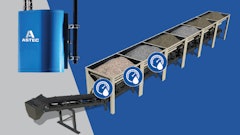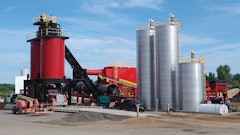
The asphalt manufacturing industry has experienced increasing demand over past five years, despite challenges caused by the COVID-19 pandemic. Increasing prices of substitute materials, such as cement, caused demand for this industry's asphalt paving products to rise slightly during the current period, boosting industry revenue.
Now, however, skyrocketing oil prices have made asphalt—and all petroleum byproducts—almost obscenely expensive. And the inflation of all products and goods reliant on transportation is painfully familiar to us all.
In addition, a recent study by Yale University suggests “fresh asphalt is a significant, yet overlooked, source of air pollution. In fact, the material's contribution to one kind of particulate air pollution could rival or even exceed that of cars and trucks.”
Not that asphalt production—or paving—is going away anytime soon.
The Hard Facts
About 93% of the 2.2 million miles of paved roads and highways in the U.S. are paved with asphalt. Most road construction is funded by states, counties, or other federal programs. Thus demand for asphalt and road oils are largely dependent on the level of funding available. During the recession most local governments collected less revenue and could not afford investment in infrastructure. That’s recently changed.
President Biden’s Bipartisan Infrastructure Law calls for allocating $110 billion to modernize 20,000 miles of highways, roads, and main streets. Funding improvements to roads, bridges, railways, and other infrastructure has been a central piece of President Biden’s recovery plans. This is good for us in the asphalt industry and good for the nation.
We have an opportunity before us.
Overall, our industry is not suffering that badly, and it’s clear we’ll be around for the long haul. But we need to do better. If our roads and streets can be built more resiliently to last longer, we need to pursue ways to make that happen. And if we can pave with less-toxic materials, we must do that too.
In the past decade, technologies have been developed to help us address each of these issues to make asphalt paving more sustainable. And it would appear the solutions are rooted in our agricultural industry.
Product Evolution
From the Holland-based Biobased Press: “In the Netherlands there are now test-case bio-based roads and cycle paths, paved with a bitumen-like product made from the natural binder lignin. These include a section of road on an industrial site – used daily by cars and heavy trucks, some minor roads, and a cycle path at Wageningen University & Research, which is in three sections, each produced using a different lignin-based bio-bitumen. 'We already built eight demonstration roads in the Netherlands with this type of new binder, so 50% lignin, 50% bitumen,’ explains Richard Gosselink, from Wageningen Food & Biobased Research. 'We now have four years’ experience with that, and it looks very good.’”
Back in the US, the New Mexico Department of Transportation (NMDOT) manages a 12,000-mile road network with limited funding and takes pride in utilizing innovative paving techniques to repair aged roadways. Indulin emulsifier chemistry enables the milling, rejuvenating and replacement of asphalt highways, which makes the process better for the environment, faster and less expensive, and creates longer lasting roads.
Since 2018, the Minnesota Department of Transportation (MnROAD) has been testing biobased rejuvenators, including some developed by “agricultural conglomerate Cargill and aggregate supplier Hardrives – a substance that “promises to reverse the effects of aging when the existing asphalt roadway is recycled back into the new road,” Ben Worel, MnROAD research operations engineer and project manager for this partnership, said in a statement.
The New Mexico Department of Transportation (NMDOT) has been utilizing Indulin emulsifiers, a key ingredient in successful pavement preservation techniques across the globe. The unique Indulin formulations enable paving managers to work with asphalt technologies that are water-based, rather than solvent-based, which means significant cost and energy savings from the elimination of traditional asphalt heating, mixing and transportation demands. And there are tremendous upsides:
- Toad can be reopened to traffic 40% sooner
- Cost 50% less to construct
- Reduce greenhouse gas emissions of 90%
Iowa State University’s Institute for Transportation’s research project “Development of Bio-Based Polymers for Use in Asphalt” states: Soybean oil is the world’s most abundant vegetable oil and currently costs 40 percent less than butadiene, which is commonly used as an asphalt binder. Supplanting butadiene with a soy binder would translate into lower costs of polymer-modified asphalt. Polymerized triglycerides are also intrinsically renewable, environmentally friendly, and safer to handle than butadiene.
Looking Ahead
With future implementation of the developed biopolymers, soybean oil can be utilized to produce polymers for use in the asphalt industry. This can create improved economic opportunities for soybeans, resulting in economic value to soy farmers and further maintaining soil qualities through a balanced crop rotation with corn.
This is a significant opportunity for both farmers and asphalt contractors.
Transportation agencies, municipalities, and private parties alike throughout the nation significantly lengthen the lifespan of asphalt paving through the use of RePlay, a soy- and recycled-Styrofoam-based asphalt sealer that’s 100-percent nontoxic, can double or triple the lifespan of asphalt pavement, contributes no VOCs, and can cure as quickly as 30 minutes. This soy byproduct can also be applied and night and goes on clear, so that restriping isn’t necessary. Again, this preservation agent saves time and budget and contributes zero pollution.
A 2019 study conducted by the National Center for Asphalt Technology at Auburn University found that “rejuvenating fog seals are a low-cost option for preventing or retarding the surface deterioration of pavements, practical in use since they do not require specialized equipment, and can be effective for restoring the surface condition of an existing pavement.” Out of seven different rejuvenators (of various makeup) tested, RePlay and BioRestor® received an A-grade.
There’s no shortage of soybeans in the US, and the soy industry’s markets are expansive, at this point mostly devoted to feedstock. Right now, the two biggest producers of soybeans are the US and Brazil, which tells us if soy becomes a major player in pavement preservation, it will help ease our nation’s reliance on foreign oil sources.
With our country’s increased federal budget for infrastructure—a large part of which is road construction—it only makes sense to preserve what we build. It’s a sustainable solution that’s better for the environment and saves precious dollars, both public and private.
We as an industry need to think of the future, a future that is cleaner, more sustainable, and far less reliant on petroleum. This will be good for us, our children, and our planet.






























